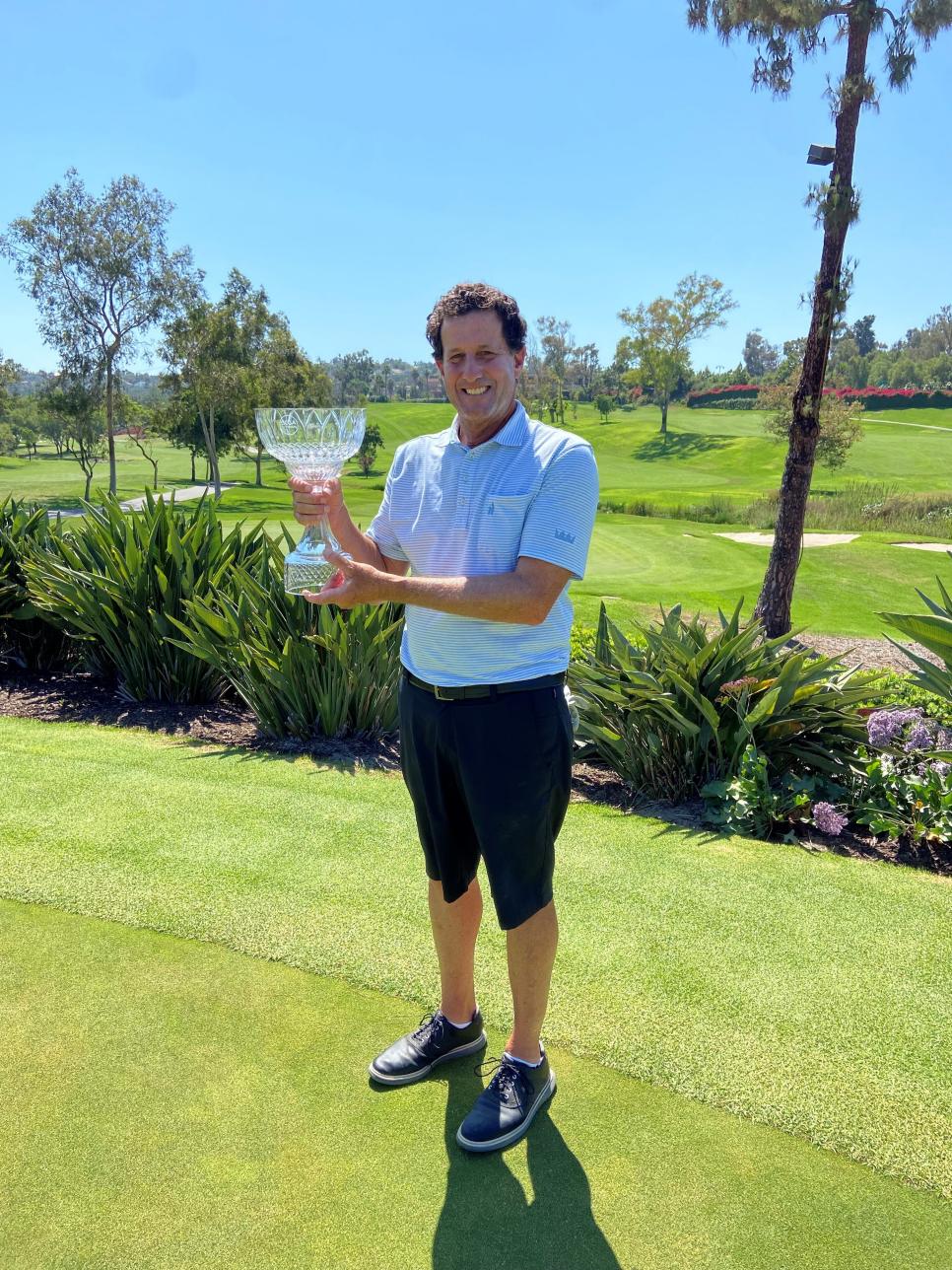Jim Plotkin’s year began just like any other back in 2018. The former touring golf professional and teaching professional at a San Diego area-course was playing lots of leisurely golf, competing in some tournaments, going surfing and even enjoying a senior softball league with his 81-year-old father. Then everything changed.
A physician’s assistant noticed a bump on his neck and promptly steered Plotkin to an Ear, Nose, and Throat specialist who said the lump wasn’t big enough to biopsy. Later in the year, a blood test revealed a high white blood cell count. Plotkin started feeling ill, getting even worse while competing in the 2018 California Senior Golf Championship in November. After the tournament, Plotkin was told to see a local oncologist/hematologist who identified the problem as chronic lymphocytic leukemia (CLL), a slow-growing form of blood cancer. Approximately 20,700 Americans are affected by CLL each year, making it one of the most common leukemias among adults. “I surely wasn’t ready,” recalls Plotkin. “It threw me for a loop mentally. Couldn’t stop thinking about it. I’d heard of leukemia but never of CLL.”
After initially working with a local hematologist, Plotkin decided to switch to an oncologist who specialized in treating CLL, Dr. Michael Choi. When he first met Plotkin, Dr. Choi saw someone who had a passion to remain active. Dr. Choi decided to place Plotkin on a chemo-free treatment regimen of oral VENCLEXTA® plus GAZYVA® (obinutuzumab) infusion. Learn more about approved use and safety information for VENCLEXTA® (venetoclax tablets; 10mg, 50mg, 100mg). “It is a treatment that is used for a defined treatment period. We started and finished the CLL regimen about a year later, and after that, we hoped Jim would experience a treatment-free remission,” said Dr. Choi.

Jack Margaros/Southern California Golf Association
Plotkin has been off the drug for nearly four years and says he is doing great. He played well in tournaments after treatment and secured his first Northern California Golf Association (NCGA) win in 2022 at the NCGA Senior Championship.
“Golf has been part of my therapy,” Plotkin says. He now has a new perspective when stepping onto a course. “I’ve enjoyed getting back out there and competing again. My outlook is better after fighting cancer. Now, when I’m standing over a four-footer in a tournament, who cares? I don’t feel the pressure. A potentially bad day on the course doesn’t bother me anymore.”
Plotkin is living what he considers a great life and can often be found negotiating local fairways. He’s also working and enjoying family time. He says, “Life is good, and I look forward to it staying that way.”
UseVENCLEXTA is a prescription medicine used to treat adults with chronic lymphocytic leukemia (CLL) or small lymphocytic lymphoma (SLL).It is not known if VENCLEXTA is safe and effective in children.
IMPORTANT SAFETY INFORMATION
What is the most important information I should know about VENCLEXTA?
VENCLEXTA can cause serious side effects, including:Tumor lysis syndrome (TLS). TLS is caused by the fast breakdown of cancer cells. TLS can cause kidney failure, the need for dialysis treatment, and may lead to death. Your healthcare provider will do tests to check your risk of getting TLS before you start taking VENCLEXTA. You will receive other medicines before starting and during treatment with VENCLEXTA to help reduce your risk of TLS. You may also need to receive intravenous (IV) fluids into your vein. Your healthcare provider will do blood tests to check for TLS when you first start treatment and during treatment with VENCLEXTA. It is important to keep your appointments for blood tests. Tell your healthcare provider right away if you have any symptoms of TLS during treatment with VENCLEXTA, including fever, chills, nausea, vomiting, confusion, shortness of breath, seizures, irregular heartbeat, dark or cloudy urine, unusual tiredness, or muscle or joint pain.Drink plenty of water during treatment with VENCLEXTA to help reduce your risk of getting TLS. Drink 6 to 8 glasses (about 56 ounces total) of water each day, starting 2 days before your first dose, on the day of your first dose of VENCLEXTA, and each time your dose is increased.Your healthcare provider may delay, decrease your dose, or stop treatment with VENCLEXTA if you have side effects. When restarting VENCLEXTA after stopping for 1 week or longer, your healthcare provider may again check for your risk of TLS and change your dose.
Who should not take VENCLEXTA?Certain medicines must not be taken when you first start taking VENCLEXTA and while your dose is being slowly increased because of the risk of increased TLS.
- Tell your healthcare provider about all the medicines you take, including prescription and over-the-counter medicines, vitamins, and herbal supplements. VENCLEXTA and other medicines may affect each other causing serious side effects.
- Do not start new medicines during treatment with VENCLEXTA without first talking with your healthcare provider.
Before taking VENCLEXTA, tell your healthcare provider about all of your medical conditions, including if you:
- have kidney or liver problems.
- have problems with your body salts or electrolytes, such as potassium, phosphorus, or calcium.
- have a history of high uric acid levels in your blood or gout.
- are scheduled to receive a vaccine. You should not receive a “live vaccine” before, during, or after treatment with VENCLEXTA, until your healthcare provider tells you it is okay. If you are not sure about the type of immunization or vaccine, ask your healthcare provider. These vaccines may not be safe or may not work as well during treatment with VENCLEXTA.
- are pregnant or plan to become pregnant. VENCLEXTA may harm your unborn baby. If you are able to become pregnant, your healthcare provider should do a pregnancy test before you start treatment with VENCLEXTA, and you should use effective birth control during treatment and for 30 days after the last dose of VENCLEXTA. If you become pregnant or think you are pregnant, tell your healthcare provider right away.
- are breastfeeding or plan to breastfeed. It is not known if VENCLEXTA passes into your breast milk. Do not breastfeed during treatment with VENCLEXTA and for 1 week after the last dose.
What should I avoid while taking VENCLEXTA?You should not drink grapefruit juice or eat grapefruit, Seville oranges (often used in marmalades), or starfruit while you are taking VENCLEXTA. These products may increase the amount of VENCLEXTA in your blood.
What are the possible side effects of VENCLEXTA?VENCLEXTA can cause serious side effects, including:
- Low white blood cell counts (neutropenia). Low white blood cell counts are common with VENCLEXTA, but can also be severe. Your healthcare provider will do blood tests to check your blood counts during treatment with VENCLEXTA and may pause dosing.
- Infections. Death and serious infections such as pneumonia and blood infection (sepsis) have happened during treatment with VENCLEXTA. Your healthcare provider will closely monitor and treat you right away if you have a fever or any signs of infection during treatment with VENCLEXTA.
Tell your healthcare provider right away if you have a fever or any signs of an infection during treatment with VENCLEXTA.
The most common side effects of VENCLEXTA when used in combination with obinutuzumab or rituximab or alone in people with CLL or SLL include low white blood cell counts; low platelet counts; low red blood cell counts; diarrhea; nausea; upper respiratory tract infection; cough; muscle and joint pain; tiredness; and swelling of your arms, legs, hands, and feet.VENCLEXTA may cause fertility problems in males. This may affect your ability to father a child. Talk to your healthcare provider if you have concerns about fertility.These are not all the possible side effects of VENCLEXTA. For more information, ask your healthcare provider or pharmacist.You are encouraged to report side effects of prescription drugs to the FDA. Visit www.fda.gov/medwatch or call 1-800-FDA-1088.If you cannot afford your medication, contact genentech-access.com/patient/brands/venclexta for assistance.Please see full Prescribing Information, including Medication Guide at https://www.rxabbvie.com/pdf/venclexta.pdf.
VENCLEXTA® and its design are registered trademarks of AbbVie Inc.
© 2024 AbbVie and Genentech USA, Inc. All rights reserved.
US-VENC-240101 November 2024
This article was originally published on golfdigest.com

